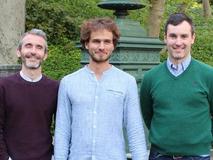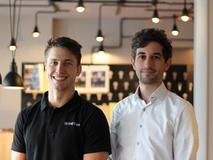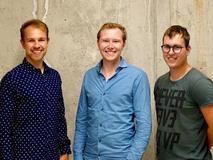Startups turning waste into value, developing an innovative drilling robot, a sustainable cellulose white pigment, providing innovative biomaterial, offering crowdsourced data labeling using the mobile ad market each win CHF 10,000
27.09.2022
Gaia Technologies, Grabowski, Impossible Materials, InkVivo, and Rapidata win Venture Kick's first stage of financial and entrepreneurial support. Their projects produce clean label ingredients for cosmetics, food, and feed manufacturers out of agricultural sidestreams, design 100% plant-based cellulose white pigment and opacifier solutions for a wide range of industries, providing a patented biomaterial platform revolutionizing the way drugs can be administered to patients, and have an app/game user complete small tasks such as labeling or validating data in a gamified way to generate value.
 |
 Gaia Technologies: from left to right Dr. Enrico Tenaglia, Mr. Claudio Reinhard, and Mr. Samuel Buhlmann
|
 Grabowski: Dr. Hans-Jörg Dennig
|
 Impossible Materials: Lukas Schertel
|
 InkVivo: Elia Guzzi (project leader and technology expert) on the left and Stefano Cerutti (business and financial expert) on the right.
|
 Rapidata: Robotic Engineers Marian Kannwischer, Jason Corkill, and Full-stack web development Luca Strebel
|
Gaia Technologies: Turning waste into value
The cosmetic, food, and pet food industries eagerly look for new cost-effective natural ingredients coming from sustainable supply chains and equaling or surpassing the performance of current standards. This is a response to growing consumer demand for healthy ingredients and increasing regulatory pressure against synthetic compounds. This need of manufacturing companies can be matched by the development of cost-effective upcycling methods to recover bio-compounds (and additional marketable resources) from agricultural sidestreams and transform them into clean-label ingredients.
Gaia Technologies has invented an innovative method to upcycle agricultural sidestreams into bio-compounds and added-value ingredients. The core team is composed of Mr. Claudio Reinhard, Dr. Enrico Tenaglia, and Mr. Samuel Buhlmann. Claudio is a mechanical engineer and leader of the EIT Food project Phenoliva which laid the foundations of Gaia Technologies. Claudio Reinhard started the sidestreams research at ETH Zurich where he currently leads the project Phenoliva. Gaia Tech is currently in the process of obtaining the ETH spin-off label. Through its novel approach, Gaia tackles the ever-increasing trend to substitute synthetic compounds with natural alternatives in the cosmetics, food, and feed sector. At the same time, Gaia responds to the pressing needs of the primary sector to create new value streams and reduce its environmental footprint. Gaia Tech builds on the results from the EIT Food project Phenoliva and aims to commercialize a portfolio of value-added products derived from olive pomace (e.g. antioxidants, biochar, activated carbon, biogas) obtained through a technology that, differently from competitors' solutions, is cost-effective and highly scalable. The market of natural antioxidants is predicted to grow at a CAGR of 6.6% to over 1 billion by 2027.
The Venture Kick funds will be used to get access to lab and pilot infrastructure, optimize and upscale our extraction process, obtain important product certifications, and increase Gaia Tech's visibility. gaiatech.ch
Grabowski: innovative drilling robot
Heat generation through geothermal energy is a key factor for the successful heat transition worldwide. However, the production of the borehole for the geothermal probe is energy-intensive, expensive, inaccurate, causes noise as well as massive landscape damage, and requires a lot of space. As a result, many buildings cannot benefit from geothermal heat.
Grabowski is developing an innovative drilling robot, which eliminates the above-mentioned disadvantages. In particular, construction costs are drastically reduced due to an autonomous and energy-efficient mode of operation. The business consists of providing this drilling robot to drilling companies worldwide. Revenue is generated through the sale of the drilled borehole, including the geothermal probe. The project has been based at the Zurich University of Applied Sciences as a research project. The initiator and driving force behind it all is Dr. Hans-Jörg Dennig, a mechanical engineer, lecturer, and experienced founder. His team consists of three other mechanical engineers and an electrical and software engineer.
There is huge potential for this worldwide. In Switzerland, for example, the number of geothermal probes is to be increased by 100,000 by 2030. In Germany, approx. 7.5 million geothermal probes are to be produced by 2050.
The funding from Venture Kick is to be used to construct a complete drilling robot, including peripherals and patent applications.
Impossible Materials: sustainable cellulose white pigments
Regulators are banning the use of titanium dioxide, ruling it unsafe as a food additive (“E171”) and threatening other health-sensitive segments. Additionally, businesses look at natural ingredients as strategic opportunities driven by an end-user request for plant-based products and climate change policies to reduce CO2 emissions. Users of TiO2 are forced to seek safe and sustainable alternatives whilst current substitutes lack performance.
Impossible Materials provides businesses with plant-based formulation ingredients to enable them more sustainable product formulations and work towards a circular economy. Their first product is a cellulose white pigment to replace the market
leader, titanium dioxide. They will initially sell to health-sensitive sectors, such as food, pharma, and cosmetics. In food, cellulose white pigments will serve as an enabler for plant-based meat/fish and dairy products. Further market extension potential lies in paint, coatings, and inks. Their process has the potential to save millions of tons of CO2 emissions at scale. Their proprietary technology has been developed by leading cellulose experts Prof. Silvia Vignolini together with Dr. Lukas Schertel who teamed up with Oliver Polcher, a serial entrepreneur, to complement the skillset with proven start-up expertise.
They would like to use the funds of venture Kick Stage 1 to turn the existing customer traction into commitment by working with them on collaboration details, including material testing, facility visits, and agreement outlining. www.impossiblematerials.com
InkVivo: patented biomaterial platform revolutionizing the way drugs can be administered to patients
The current pharmaceutical sector is facing challenges in controlling the temporal release of active ingredients. The short duration and not localized action of these drugs often provide suboptimal therapeutic effects. Typically, this is compensated with high dosages and frequent administrations of medicines, resulting in an increased risk of side effects and long-term complications. As an example, after orthopedic surgeries, more than 65% of the patients experience complications such as tissue inflammation and severe to moderate pain. A suboptimal treatment based on medicines with short therapeutic effects and limited efficacy often delays the recovery of the patient in the postoperative phase and increases the risk to develop long-term complications (e.g., chronic pain and opioid addiction).
InkVivo combines a patented biomaterial platform with additive manufacturing to produce and customize resorbable drug delivery systems tuned to the clinical challenge. The specific composition and formulation of the fabricated systems ensure a controlled and prolonged release of active ingredients. This has the potential to enhance the therapeutic outcome of the treatment while minimizing off-target side effects. As a first clinical challenge, we address postoperative care after orthopedic surgeries, a market representing over 4Mn surgeries in US and Europe by 2025. Elia Guzzi, Ph.D. from ETH Zurich, and Stefano Cerutti, EMBA from HEC Lausanne are the co-founders of InkVivo. They fabricate implantable and resorbable scaffolds loaded with specific medicines (e.g., anti-inflammatory and analgesic drugs). The system will be implanted locally during the surgery to preemptively minimize postoperative inflammation and pain while accelerating the recovery of the patient. Initially, InkVivo targets the global postoperative pain management market, which is expected to be worth USD 45.8 billion in 2026, and it is projected to increase at a CAGR of 5.1% beyond 2026. In parallel, InkVivo will be operating also in the emerging market of 3D-printed drug products, which is expected to grow at a CAGR of 9.1% through 2027 to reach USD >57 million by 2027.
Venture Kick financing will partly be used to further refine their go-to-market strategy and acquire the right profile with startup and pharma/biotech experience to begin the incorporation process. inkvivo.tech
Rapidata: Crowdsourced data labeling using the mobile ad market
Machine Learning and AI have made huge gains in the past few years and have ever more use cases. These algorithms need to be trained for their desired task using examples called “Training Data”. Much of this data needs to be labeled or validated by humans and this is a very slow and expensive process. Existing competitors in the exponentially growing data labeling market either have a fixed local or low-cost country workforce. This also creates an entry barrier for new customers, as these companies have large, fixed costs and are only interested in large customers.
Free apps on phones attract billions of users and are a huge market. In many of these free games/apps, there are mechanisms to watch up to 50s ads to gain either an advantage or time in the game/app. These ads are annoying, and the user's time could be used in a much more effective way to generate value. Instead of an ad, Rapidata will have the user complete small tasks that are simple for a human but hard for a computer, such as labeling and validating data in a gamified way to generate value. A dedicated and optional front end allows each customer to create the tasks they need. This makes the system even easier to scale. The original startup idea came from Marian Kannwischer and Jason Corkill, both Robotics engineers from ETH with expertise in AI and computer vision. To build the system robustly and scalable, Luca Strebel, an expert in full-stack web development with seven years of industry experience joined the crew once the first prototype was implemented. They enter the data labeling market, which, due to the increasing size of neural networks and use cases of AI, is projected to grow exponentially from today’s USD 10 billion to USD 45 billion in 2029.
The Venture Kick funds will allow them to rapidly accelerate the development of their service by allowing them to evaluate and refine it in the real advertisement market. Additionally, the funds will drive the push to market, freeing up resources by outsourcing a framework website for clients, front-end design, and some other front-end challenges that will be solved much faster. This will allow them to focus on the underlying system and database, therefore, bringing the product to market a lot faster and spurring growth. This is particularly important in the fast-moving and innovative AI tech sector, where establishing early and moving fast is very beneficial.
The cosmetic, food, and pet food industries eagerly look for new cost-effective natural ingredients coming from sustainable supply chains and equaling or surpassing the performance of current standards. This is a response to growing consumer demand for healthy ingredients and increasing regulatory pressure against synthetic compounds. This need of manufacturing companies can be matched by the development of cost-effective upcycling methods to recover bio-compounds (and additional marketable resources) from agricultural sidestreams and transform them into clean-label ingredients.
Gaia Technologies has invented an innovative method to upcycle agricultural sidestreams into bio-compounds and added-value ingredients. The core team is composed of Mr. Claudio Reinhard, Dr. Enrico Tenaglia, and Mr. Samuel Buhlmann. Claudio is a mechanical engineer and leader of the EIT Food project Phenoliva which laid the foundations of Gaia Technologies. Claudio Reinhard started the sidestreams research at ETH Zurich where he currently leads the project Phenoliva. Gaia Tech is currently in the process of obtaining the ETH spin-off label. Through its novel approach, Gaia tackles the ever-increasing trend to substitute synthetic compounds with natural alternatives in the cosmetics, food, and feed sector. At the same time, Gaia responds to the pressing needs of the primary sector to create new value streams and reduce its environmental footprint. Gaia Tech builds on the results from the EIT Food project Phenoliva and aims to commercialize a portfolio of value-added products derived from olive pomace (e.g. antioxidants, biochar, activated carbon, biogas) obtained through a technology that, differently from competitors' solutions, is cost-effective and highly scalable. The market of natural antioxidants is predicted to grow at a CAGR of 6.6% to over 1 billion by 2027.
The Venture Kick funds will be used to get access to lab and pilot infrastructure, optimize and upscale our extraction process, obtain important product certifications, and increase Gaia Tech's visibility. gaiatech.ch
Grabowski: innovative drilling robot
Heat generation through geothermal energy is a key factor for the successful heat transition worldwide. However, the production of the borehole for the geothermal probe is energy-intensive, expensive, inaccurate, causes noise as well as massive landscape damage, and requires a lot of space. As a result, many buildings cannot benefit from geothermal heat.
Grabowski is developing an innovative drilling robot, which eliminates the above-mentioned disadvantages. In particular, construction costs are drastically reduced due to an autonomous and energy-efficient mode of operation. The business consists of providing this drilling robot to drilling companies worldwide. Revenue is generated through the sale of the drilled borehole, including the geothermal probe. The project has been based at the Zurich University of Applied Sciences as a research project. The initiator and driving force behind it all is Dr. Hans-Jörg Dennig, a mechanical engineer, lecturer, and experienced founder. His team consists of three other mechanical engineers and an electrical and software engineer.
There is huge potential for this worldwide. In Switzerland, for example, the number of geothermal probes is to be increased by 100,000 by 2030. In Germany, approx. 7.5 million geothermal probes are to be produced by 2050.
The funding from Venture Kick is to be used to construct a complete drilling robot, including peripherals and patent applications.
Impossible Materials: sustainable cellulose white pigments
Regulators are banning the use of titanium dioxide, ruling it unsafe as a food additive (“E171”) and threatening other health-sensitive segments. Additionally, businesses look at natural ingredients as strategic opportunities driven by an end-user request for plant-based products and climate change policies to reduce CO2 emissions. Users of TiO2 are forced to seek safe and sustainable alternatives whilst current substitutes lack performance.
Impossible Materials provides businesses with plant-based formulation ingredients to enable them more sustainable product formulations and work towards a circular economy. Their first product is a cellulose white pigment to replace the market
leader, titanium dioxide. They will initially sell to health-sensitive sectors, such as food, pharma, and cosmetics. In food, cellulose white pigments will serve as an enabler for plant-based meat/fish and dairy products. Further market extension potential lies in paint, coatings, and inks. Their process has the potential to save millions of tons of CO2 emissions at scale. Their proprietary technology has been developed by leading cellulose experts Prof. Silvia Vignolini together with Dr. Lukas Schertel who teamed up with Oliver Polcher, a serial entrepreneur, to complement the skillset with proven start-up expertise.
They would like to use the funds of venture Kick Stage 1 to turn the existing customer traction into commitment by working with them on collaboration details, including material testing, facility visits, and agreement outlining. www.impossiblematerials.com
InkVivo: patented biomaterial platform revolutionizing the way drugs can be administered to patients
The current pharmaceutical sector is facing challenges in controlling the temporal release of active ingredients. The short duration and not localized action of these drugs often provide suboptimal therapeutic effects. Typically, this is compensated with high dosages and frequent administrations of medicines, resulting in an increased risk of side effects and long-term complications. As an example, after orthopedic surgeries, more than 65% of the patients experience complications such as tissue inflammation and severe to moderate pain. A suboptimal treatment based on medicines with short therapeutic effects and limited efficacy often delays the recovery of the patient in the postoperative phase and increases the risk to develop long-term complications (e.g., chronic pain and opioid addiction).
InkVivo combines a patented biomaterial platform with additive manufacturing to produce and customize resorbable drug delivery systems tuned to the clinical challenge. The specific composition and formulation of the fabricated systems ensure a controlled and prolonged release of active ingredients. This has the potential to enhance the therapeutic outcome of the treatment while minimizing off-target side effects. As a first clinical challenge, we address postoperative care after orthopedic surgeries, a market representing over 4Mn surgeries in US and Europe by 2025. Elia Guzzi, Ph.D. from ETH Zurich, and Stefano Cerutti, EMBA from HEC Lausanne are the co-founders of InkVivo. They fabricate implantable and resorbable scaffolds loaded with specific medicines (e.g., anti-inflammatory and analgesic drugs). The system will be implanted locally during the surgery to preemptively minimize postoperative inflammation and pain while accelerating the recovery of the patient. Initially, InkVivo targets the global postoperative pain management market, which is expected to be worth USD 45.8 billion in 2026, and it is projected to increase at a CAGR of 5.1% beyond 2026. In parallel, InkVivo will be operating also in the emerging market of 3D-printed drug products, which is expected to grow at a CAGR of 9.1% through 2027 to reach USD >57 million by 2027.
Venture Kick financing will partly be used to further refine their go-to-market strategy and acquire the right profile with startup and pharma/biotech experience to begin the incorporation process. inkvivo.tech
Rapidata: Crowdsourced data labeling using the mobile ad market
Machine Learning and AI have made huge gains in the past few years and have ever more use cases. These algorithms need to be trained for their desired task using examples called “Training Data”. Much of this data needs to be labeled or validated by humans and this is a very slow and expensive process. Existing competitors in the exponentially growing data labeling market either have a fixed local or low-cost country workforce. This also creates an entry barrier for new customers, as these companies have large, fixed costs and are only interested in large customers.
Free apps on phones attract billions of users and are a huge market. In many of these free games/apps, there are mechanisms to watch up to 50s ads to gain either an advantage or time in the game/app. These ads are annoying, and the user's time could be used in a much more effective way to generate value. Instead of an ad, Rapidata will have the user complete small tasks that are simple for a human but hard for a computer, such as labeling and validating data in a gamified way to generate value. A dedicated and optional front end allows each customer to create the tasks they need. This makes the system even easier to scale. The original startup idea came from Marian Kannwischer and Jason Corkill, both Robotics engineers from ETH with expertise in AI and computer vision. To build the system robustly and scalable, Luca Strebel, an expert in full-stack web development with seven years of industry experience joined the crew once the first prototype was implemented. They enter the data labeling market, which, due to the increasing size of neural networks and use cases of AI, is projected to grow exponentially from today’s USD 10 billion to USD 45 billion in 2029.
The Venture Kick funds will allow them to rapidly accelerate the development of their service by allowing them to evaluate and refine it in the real advertisement market. Additionally, the funds will drive the push to market, freeing up resources by outsourcing a framework website for clients, front-end design, and some other front-end challenges that will be solved much faster. This will allow them to focus on the underlying system and database, therefore, bringing the product to market a lot faster and spurring growth. This is particularly important in the fast-moving and innovative AI tech sector, where establishing early and moving fast is very beneficial.


